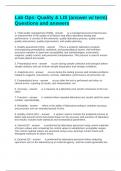-
1. Exam (elaborations) - Laboratory management
-
2. Exam (elaborations) - Laboratory management-exam 1 questions and answers
-
3. Exam (elaborations) - Laboratory management (medtech) questions and answers
-
4. Exam (elaborations) - Lab management mcq questions and answers
-
5. Exam (elaborations) - Laboratory management exam #1 questions and answers
-
6. Exam (elaborations) - Lab management module 1 questions and answers
-
7. Exam (elaborations) - Laboratory management - material management questions and answers
-
8. Exam (elaborations) - Laboratory management exam 1 questions and answers
-
9. Exam (elaborations) - Laboratory management quiz questions and answers
-
10. Exam (elaborations) - Laboratory management questions and answers
-
11. Exam (elaborations) - Lab management quiz 1 questions and answers
-
12. Exam (elaborations) - Laboratory management 1st long exam reviewer questions and answers
-
13. Exam (elaborations) - Success! laboratory management questions and answers
-
14. Exam (elaborations) - Lab management questions and answers
-
15. Exam (elaborations) - Certification exam laboratory management questions and answers
-
16. Exam (elaborations) - Lab management prelims (quipper) questions and answers
-
17. Exam (elaborations) - Mls 4158 - laboratory management & operations - exam 2 questions and answers
-
18. Exam (elaborations) - Lab management final questions and answers
-
19. Exam (elaborations) - Lab management exam 7n questions & answers
-
20. Exam (elaborations) - Laboratory management leaderships questions and answers
-
21. Exam (elaborations) - Laboratory management questions and answers
-
22. Exam (elaborations) - Laboratory management questions and answers
-
23. Exam (elaborations) - Laboratory management questions & answers
-
24. Exam (elaborations) - Lab management questions and answers
-
25. Exam (elaborations) - Laboratory management: principles and processes (3rd ed.) questions and answers
-
26. Exam (elaborations) - Lab management final pt 1 questions and answers
-
27. Exam (elaborations) - Overview of laboratory management questions and answers
-
28. Exam (elaborations) - Laboratory management laboratory safety questions and answers
-
29. Exam (elaborations) - Chapter 8 laboratory management reading questions and answers
-
30. Exam (elaborations) - Laboratory management test 2 review weeks 7-11 questions and answers
-
31. Exam (elaborations) - Lab management quiz 3 mlt-mls uams questions and answers
-
32. Exam (elaborations) - Lab management final pt 2 questions and answers
-
33. Exam (elaborations) - Mt laws & lab management questions and answers
-
34. Exam (elaborations) - Uams lab management quiz 5 questions and answers
-
35. Exam (elaborations) - Lab management final exam review questions and answers
-
36. Exam (elaborations) - Lab management quiz 4 questions and answers
-
37. Exam (elaborations) - Lab management 4750 quiz 3 questions and answers
-
38. Exam (elaborations) - Clinical laboratory management - final exam questions and answers
-
39. Exam (elaborations) - Uams lab management quiz 3 questions and answers
-
40. Exam (elaborations) - Laboratory financial management questions and answers
-
41. Exam (elaborations) - Laboratory management questions and answers
-
42. Exam (elaborations) - Quality management in the medical laboratory questions and answers
-
43. Exam (elaborations) - Laboratory management questions and answers
-
44. Exam (elaborations) - Lab operations lab ce questions and answers
-
45. Exam (elaborations) - Basic management principles questions and answers
-
46. Exam (elaborations) - Quality management system questions & answers
-
47. Exam (elaborations) - Lab ops: quality & lis (answer w/ term) questions and answers
-
48. Exam (elaborations) - Laboratory management and safety final questions and answers
-
49. Exam (elaborations) - Boc laboratory operations – management questions and answers
-
50. Exam (elaborations) - Labman questions and answers
-
51. Exam (elaborations) - Education and management questions and answers
-
52. Exam (elaborations) - Week 11 clinical lab management questions and answers
-
53. Exam (elaborations) - U cls-m laboratory practices exam questions and answers
-
54. Exam (elaborations) - Risk management and safety in the laboratory questions and answers
-
55. Exam (elaborations) - Education and management questions and answers
-
56. Exam (elaborations) - Leadership (laboratory management) questions and answers
-
57. Exam (elaborations) - Boc urinalysis - body fluids - lab management questions and answers
-
58. Exam (elaborations) - Labmng organizing and staffing the laboratory questions and answers
-
59. Exam (elaborations) - Lab management final questions and answers
-
60. Exam (elaborations) - Laboratory regulations questions and answers
-
61. Exam (elaborations) - Lab management quiz 4 mlt-mls uams questions and answers
-
62. Exam (elaborations) - Quality management in the medical laboratory questions and answers
-
Show more




